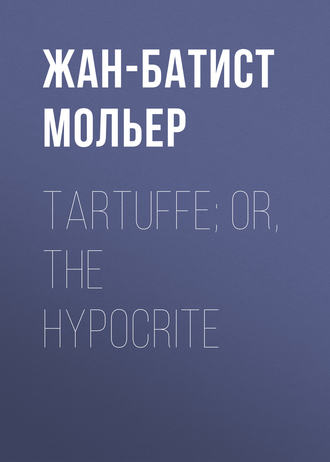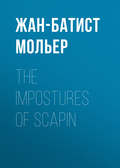полная версия

Мольер (Жан-Батист Поклен)
Tartuffe; Or, The Hypocrite
Who, skilled in prayer, have always much to ask,
And live at court to preach retirement;
Who reconcile religion with their vices,
Are quick to anger, vengeful, faithless, tricky,
And, to destroy a man, will have the boldness
To call their private grudge the cause of heaven;
All the more dangerous, since in their anger
They use against us weapons men revere,
And since they make the world applaud their passion,
And seek to stab us with a sacred sword.
There are too many of this canting kind.
Still, the sincere are easy to distinguish;
And many splendid patterns may be found,
In our own time, before our very eyes
Look at Ariston, Periandre, Oronte,
Alcidamas, Clitandre, and Polydore;
No one denies their claim to true religion;
Yet they're no braggadocios of virtue,
They do not make insufferable display,
And their religion's human, tractable;
They are not always judging all our actions,
They'd think such judgment savoured of presumption;
And, leaving pride of words to other men,
'Tis by their deeds alone they censure ours.
Evil appearances find little credit
With them; they even incline to think the best
Of others. No caballers, no intriguers,
They mind the business of their own right living.
They don't attack a sinner tooth and nail,
For sin's the only object of their hatred;
Nor are they over-zealous to attempt
Far more in heaven's behalf than heaven would have 'em.
That is my kind of man, that is true living,
That is the pattern we should set ourselves.
Your fellow was not fashioned on this model;
You're quite sincere in boasting of his zeal;
But you're deceived, I think, by false pretences.
ORGON
My dear good brother-in-law, have you quite done?
CLEANTE
Yes.
ORGON
I'm your humble servant.
(Starts to go.)
CLEANTE
Just a word.
We'll drop that other subject. But you know
Valere has had the promise of your daughter.
ORGON
Yes.
CLEANTE
You had named the happy day.
ORGON
'Tis true.
CLEANTE
Then why put off the celebration of it?
ORGON
I can't say.
CLEANTE
Can you have some other plan
In mind?
ORGON
Perhaps.
CLEANTE
You mean to break your word?
ORGON
I don't say that.
CLEANTE
I hope no obstacle
Can keep you from performing what you've promised.
ORGON
Well, that depends.
CLEANTE
Why must you beat about?
Valere has sent me here to settle matters.
ORGON
Heaven be praised!
CLEANTE
What answer shall I take him?
ORGON
Why, anything you please.
CLEANTE
But we must know
Your plans. What are they?
ORGON
I shall do the will
Of Heaven.
CLEANTE
Come, be serious. You've given
Your promise to Valere. Now will you keep it?
ORGON
Good-bye.
CLEANTE (alone)
His love, methinks, has much to fear;
I must go let him know what's happening here.
ACT II
SCENE I
ORGON, MARIANE
ORGON
Now, Mariane.
MARIANE
Yes, father?
ORGON
Come; I'll tell you
A secret.
MARIANE
Yes … What are you looking for?
ORGON (looking into a small closet-room)
To see there's no one there to spy upon us;
That little closet's mighty fit to hide in.
There! We're all right now. Mariane, in you
I've always found a daughter dutiful
And gentle. So I've always love you dearly.
MARIANE
I'm grateful for your fatherly affection.
ORGON
Well spoken, daughter. Now, prove you deserve it
By doing as I wish in all respects.
MARIANE
To do so is the height of my ambition.
ORGON
Excellent well. What say you of – Tartuffe?
MARIANE
Who? I?
ORGON
Yes, you. Look to it how you answer.
MARIANE
Why! I'll say of him – anything you please.
SCENE II
ORGON, MARIANE, DORINE (coming in quietly and standing behind
Orgon, so that he does not see her)
ORGON
Well spoken. A good girl. Say then, my daughter,
That all his person shines with noble merit,
That he has won your heart, and you would like
To have him, by my choice, become your husband.
Eh?
MARIANE
Eh?
ORGON
What say you?
MARIANE
Please, what did you say?
ORGON
What?
MARIANE
Surely I mistook you, sir?
ORGON
How now?
MARIANE
Who is it, father, you would have me say
Has won my heart, and I would like to have
Become my husband, by your choice?
ORGON
Tartuffe.
MARIANE
But, father, I protest it isn't true!
Why should you make me tell this dreadful lie?
ORGON
Because I mean to have it be the truth.
Let this suffice for you: I've settled it.
MARIANE
What, father, you would … ?
ORGON
Yes, child, I'm resolved
To graft Tartuffe into my family.
So he must be your husband. That I've settled.
And since your duty ..
(Seeing Dorine)
What are you doing there?
Your curiosity is keen, my girl,
To make you come eavesdropping on us so.
DORINE
Upon my word, I don't know how the rumour
Got started – if 'twas guess-work or mere chance
But I had heard already of this match,
And treated it as utter stuff and nonsense.
ORGON
What! Is the thing incredible?
DORINE
So much so
I don't believe it even from yourself, sir.
ORGON
I know a way to make you credit it.
DORINE
No, no, you're telling us a fairly tale!
ORGON
I'm telling you just what will happen shortly.
DORINE
Stuff!
ORGON
Daughter, what I say is in good earnest.
DORINE
There, there, don't take your father seriously;
He's fooling.
ORGON
But I tell you …
DORINE
No. No use.
They won't believe you.
ORGON
If I let my anger …
DORINE
Well, then, we do believe you; and the worse
For you it is. What! Can a grown-up man
With that expanse of beard across his face
Be mad enough to want …?
ORGON
You hark me:
You've taken on yourself here in this house
A sort of free familiarity
That I don't like, I tell you frankly, girl.
DORINE
There, there, let's not get angry, sir, I beg you.
But are you making game of everybody?
Your daughter's not cut out for bigot's meat;
And he has more important things to think of.
Besides, what can you gain by such a match?
How can a man of wealth, like you, go choose
A wretched vagabond for son-in-law?
ORGON
You hold your tongue. And know, the less he has,
The better cause have we to honour him.
His poverty is honest poverty;
It should exalt him more than worldly grandeur,
For he has let himself be robbed of all,
Through careless disregard of temporal things
And fixed attachment to the things eternal.
My help may set him on his feet again,
Win back his property – a fair estate
He has at home, so I'm informed – and prove him
For what he is, a true-born gentleman.
DORINE
Yes, so he says himself. Such vanity
But ill accords with pious living, sir.
The man who cares for holiness alone
Should not so loudly boast his name and birth;
The humble ways of genuine devoutness
Brook not so much display of earthly pride.
Why should he be so vain? … But I offend you:
Let's leave his rank, then, – take the man himself:
Can you without compunction give a man
Like him possession of a girl like her?
Think what a scandal's sure to come of it!
Virtue is at the mercy of the fates,
When a girl's married to a man she hates;
The best intent to live an honest woman
Depends upon the husband's being human,
And men whose brows are pointed at afar
May thank themselves their wives are what they are.
For to be true is more than woman can,
With husbands built upon a certain plan;
And he who weds his child against her will
Owes heaven account for it, if she do ill.
Think then what perils wait on your design.
ORGON (to Mariane)
So! I must learn what's what from her, you see!
DORINE
You might do worse than follow my advice.
ORGON
Daughter, we can't waste time upon this nonsense;
I know what's good for you, and I'm your father.
True, I had promised you to young Valere;
But, first, they tell me he's inclined to gamble,
And then, I fear his faith is not quite sound.
I haven't noticed that he's regular
At church.
DORINE
You'd have him run there just when you do.
Like those who go on purpose to be seen?
ORGON
I don't ask your opinion on the matter.
In short, the other is in Heaven's best graces,
And that is riches quite beyond compare.
This match will bring you every joy you long for;
'Twill be all steeped in sweetness and delight.
You'll live together, in your faithful loves,
Like two sweet children, like two turtle-doves;
You'll never fail to quarrel, scold, or tease,
And you may do with him whate'er you please.
DORINE
With him? Do naught but give him horns, I'll warrant.
ORGON
Out on thee, wench!
DORINE
I tell you he's cut out for't;
However great your daughter's virtue, sir,
His destiny is sure to prove the stronger.
ORGON
Have done with interrupting. Hold your tongue.
Don't poke your nose in other people's business.
DORINE (She keeps interrupting him, just as he turns and starts
to speak to his daughter).
If I make bold, sir, 'tis for your own good.
ORGON
You're too officious; pray you, hold your tongue.
DORINE
'Tis love of you …
ORGON
I want none of your love.
DORINE
Then I will love you in your own despite.
ORGON
You will, eh?
DORINE
Yes, your honour's dear to me;
I can't endure to see you made the butt
Of all men's ridicule.
ORGON
Won't you be still?
DORINE
'Twould be a sin to let you make this match.
ORGON
Won't you be still, I say, you impudent viper!
DORINE
What! you are pious, and you lose your temper?
ORGON
I'm all wrought up, with your confounded nonsense;
Now, once for all, I tell you hold your tongue.
DORINE
Then mum's the word; I'll take it out in thinking.
ORGON
Think all you please; but not a syllable
To me about it, or … you understand!
(Turning to his daughter.)
As a wise father, I've considered all
With due deliberation.
DORINE
I'll go mad
If I can't speak.
(She stops the instant he turns his head.)
ORGON
Though he's no lady's man,
Tartuffe is well enough …
DORINE
A pretty phiz!
ORGON
So that, although you may not care at all
For his best qualities …
DORINE
A handsome dowry!
(Orgon turns and stands in front of her, with arms folded, eyeing
her.)
Were I in her place, any man should rue it
Who married me by force, that's mighty certain;
I'd let him know, and that within a week,
A woman's vengeance isn't far to seek.
ORGON (to Dorine)
So – nothing that I say has any weight?
DORINE
Eh? What's wrong now? I didn't speak to you.
ORGON
What were you doing?
DORINE
Talking to myself.
ORGON
Oh! Very well. (Aside.) Her monstrous impudence
Must be chastised with one good slap in the face.
(He stands ready to strike her, and, each time he speaks to his
daughter, he glances toward her; but she stands still and says not a
word.) 3
ORGON
Daughter, you must approve of my design…
Think of this husband … I have chosen for you…
(To Dorine)
Why don't you talk to yourself?
DORINE
Nothing to say.
ORGON
One little word more.
DORINE
Oh, no, thanks. Not now.
ORGON
Sure, I'd have caught you.
DORINE
Faith, I'm no such fool.
ORGON
So, daughter, now obedience is the word;
You must accept my choice with reverence.
DORINE (running away)
You'd never catch me marrying such a creature.
ORGON (swinging his hand at her and missing her)
Daughter, you've such a pestilent hussy there
I can't live with her longer, without sin.
I can't discuss things in the state I'm in.
My mind's so flustered by her insolent talk,
To calm myself, I must go take a walk.
SCENE III
MARIANE, DORINE
DORINE
Say, have you lost the tongue from out your head?
And must I speak your role from A to Zed?
You let them broach a project that's absurd,
And don't oppose it with a single word!
MARIANE
What can I do? My father is the master.
DORINE
Do? Everything, to ward off such disaster.
MARIANE
But what?
DORINE
Tell him one doesn't love by proxy;
Tell him you'll marry for yourself, not him;
Since you're the one for whom the thing is done,
You are the one, not he, the man must please;
If his Tartuffe has charmed him so, why let him
Just marry him himself – no one will hinder.
MARIANE
A father's rights are such, it seems to me,
That I could never dare to say a word.
DORINE
Came, talk it out. Valere has asked your hand:
Now do you love him, pray, or do you not?
MARIANE
Dorine! How can you wrong my love so much,
And ask me such a question? Have I not
A hundred times laid bare my heart to you?
Do you know how ardently I love him?
DORINE
How do I know if heart and words agree,
And if in honest truth you really love him?
MARIANE
Dorine, you wrong me greatly if you doubt it;
I've shown my inmost feelings, all too plainly.
DORINE
So then, you love him?
MARIANE
Yes, devotedly.
DORINE
And he returns your love, apparently?
MARIANE
I think so.
DORINE
And you both alike are eager
To be well married to each other?
MARIANE
Surely.
DORINE
Then what's your plan about this other match?
MARIANE
To kill myself, if it is forced upon me.
DORINE
Good! That's a remedy I hadn't thought of.
Just die, and everything will be all right.
This medicine is marvellous, indeed!
It drives me mad to hear folk talk such nonsense.
MARIANE
Oh dear, Dorine you get in such a temper!
You have no sympathy for people's troubles.
DORINE
I have no sympathy when folk talk nonsense,
And flatten out as you do, at a pinch.
MARIANE
But what can you expect? – if one is timid? —
DORINE
But what is love worth, if it has no courage?
MARIANE
Am I not constant in my love for him?
Is't not his place to win me from my father?
DORINE
But if your father is a crazy fool,
And quite bewitched with his Tartuffe? And breaks
His bounden word? Is that your lover's fault?
MARIANE
But shall I publicly refuse and scorn
This match, and make it plain that I'm in love?
Shall I cast off for him, whate'er he be,
Womanly modesty and filial duty?
You ask me to display my love in public … ?
DORINE
No, no, I ask you nothing. You shall be
Mister Tartuffe's; why, now I think of it,
I should be wrong to turn you from this marriage.
What cause can I have to oppose your wishes?
So fine a match! An excellent good match!
Mister Tartuffe! Oh ho! No mean proposal!
Mister Tartuffe, sure, take it all in all,
Is not a man to sneeze at – oh, by no means!
'Tis no small luck to be his happy spouse.
The whole world joins to sing his praise already;
He's noble – in his parish; handsome too;
Red ears and high complexion – oh, my lud!
You'll be too happy, sure, with him for husband.
MARIANE
Oh dear! …
DORINE
What joy and pride will fill your heart
To be the bride of such a handsome fellow!
MARIANE
Oh, stop, I beg you; try to find some way
To help break off the match. I quite give in,
I'm ready to do anything you say.
DORINE
No, no, a daughter must obey her father,
Though he should want to make her wed a monkey.
Besides, your fate is fine. What could be better!
You'll take the stage-coach to his little village,
And find it full of uncles and of cousins,
Whose conversation will delight you. Then
You'll be presented in their best society.
You'll even go to call, by way of welcome,
On Mrs. Bailiff, Mrs. Tax-Collector,
Who'll patronise you with a folding-stool.
There, once a year, at carnival, you'll have
Perhaps – a ball; with orchestra – two bag-pipes;
And sometimes a trained ape, and Punch and Judy;
Though if your husband …
MARIANE
Oh, you'll kill me. Please
Contrive to help me out with your advice.
DORINE
I thank you kindly.
MARIANE
Oh! Dorine, I beg you …
DORINE
To serve you right, this marriage must go through.
MARIANE
Dear girl!
DORINE
No.
MARIANE
If I say I love Valere …
DORINE
No, no. Tartuffe's your man, and you shall taste him.
MARIANE
You know I've always trusted you; now help me …
DORINE
No, you shall be, my faith! Tartuffified.
MARIANE
Well, then, since you've no pity for my fate
Let me take counsel only of despair;
It will advise and help and give me courage;
There's one sure cure, I know, for all my troubles.
(She starts to go.)
DORINE
There, there! Come back. I can't be angry long.
I must take pity on you, after all.
MARIANE
Oh, don't you see, Dorine, if I must bear
This martyrdom, I certainly shall die.
DORINE
Now don't you fret. We'll surely find some way.
To hinder this … But here's Valere, your lover.
SCENE IV
VALERE, MARIANE, DORINE
VALERE
Madam, a piece of news – quite new to me —
Has just come out, and very fine it is.
MARIANE
What piece of news?
VALERE
Your marriage with Tartuffe.
MARIANE
'Tis true my father has this plan in mind.
VALERE
Your father, madam …
MARIANE
Yes, he's changed his plans,
And did but now propose it to me.
VALERE
What!
Seriously?
MARIANE
Yes, he was serious,
And openly insisted on the match.
VALERE
And what's your resolution in the matter,
Madam?
MARIANE
I don't know.
VALERE
That's a pretty answer.
You don't know?
MARIANE
No.
VALERE
No?
MARIANE
What do you advise?
VALERE
I? My advice is, marry him, by all means.
MARIANE
That's your advice?
VALERE
Yes.
MARIANE
Do you mean it?
VALERE
Surely.
A splendid choice, and worthy of your acceptance.
MARIANE
Oh, very well, sir! I shall take your counsel.
VALERE
You'll find no trouble taking it, I warrant.
MARIANE
No more than you did giving it, be sure.
VALERE
I gave it, truly, to oblige you, madam.
MARIANE
And I shall take it to oblige you, sir.
Dorine (withdrawing to the back of the stage)
Let's see what this affair will come to.
VALERE
So,
That is your love? And it was all deceit
When you …
MARIANE
I beg you, say no more of that.
You told me, squarely, sir, I should accept
The husband that is offered me; and I
Will tell you squarely that I mean to do so,
Since you have given me this good advice.
VALERE
Don't shield yourself with talk of my advice.
You had your mind made up, that's evident;
And now you're snatching at a trifling pretext
To justify the breaking of your word.
MARIANE
Exactly so.
VALERE
Of course it is; your heart
Has never known true love for me.
MARIANE
Alas!
You're free to think so, if you please.
VALERE
Yes, yes,
I'm free to think so; and my outraged love
May yet forestall you in your perfidy,
And offer elsewhere both my heart and hand.
MARIANE
No doubt of it; the love your high deserts
May win …
VALERE
Good Lord, have done with my deserts!
I know I have but few, and you have proved it.
But I may find more kindness in another;
I know of someone, who'll not be ashamed
To take your leavings, and make up my loss.
MARIANE
The loss is not so great; you'll easily
Console yourself completely for this change.
VALERE
I'll try my best, that you may well believe.
When we're forgotten by a woman's heart,
Our pride is challenged; we, too, must forget;
Or if we cannot, must at least pretend to.
No other way can man such baseness prove,
As be a lover scorned, and still in love.
MARIANE
In faith, a high and noble sentiment.
VALERE
Yes; and it's one that all men must approve.
What! Would you have me keep my love alive,
And see you fly into another's arms
Before my very eyes; and never offer
To someone else the heart that you had scorned?
MARIANE
Oh, no, indeed! For my part, I could wish
That it were done already.
VALERE
What! You wish it?
MARIANE
Yes.
VALERE
This is insult heaped on injury;
I'll go at once and do as you desire.
(He takes a step or two as if to go away.)
MARIANE
Oh, very well then.
VALERE (turning back)
But remember this.
'Twas you that drove me to this desperate pass.
MARIANE
Of course.
VALERE (turning back again)
And in the plan that I have formed
I only follow your example.
MARIANE
Yes.
VALERE (at the door)
Enough; you shall be punctually obeyed.
MARIANE
So much the better.
VALERE (coming back again)
This is once for all.
MARIANE
So be it, then.
VALERE (He goes toward the door, but just as he reaches it, turns
around)
Eh?
MARIANE
What?
VALERE
You didn't call me?
MARIANE
I? You are dreaming.
VALERE
Very well, I'm gone. Madam, farewell.
(He walks slowly away.)
MARIANE
Farewell, sir.
DORINE
I must say
You've lost your senses and both gone clean daft!
I've let you fight it out to the end o' the chapter
To see how far the thing could go. Oho, there,
Mister Valere!
(She goes and seizes him by the arm, to stop him. He makes a great
show of resistance.)
VALERE
What do you want, Dorine?
DORINE
Come here.
VALERE
No, no, I'm quite beside myself.
Don't hinder me from doing as she wishes.
3. As given at the Comedie francaise, the action is as follows: While Orgon says, "You must approve of my design," Dorine is making signs to Mariane to resist his orders; Orgon turns around suddenly; but Dorine quickly changes her gesture and with the hand which she had lifted calmly arranges her hair and her cap. Orgon goes on, "Think of the husband …" and stops before the middle of his sentence to turn and catch the beginning of Dorine's gesture; but he is too quick this time, and Dorine stands looking at his furious countenance with a sweet and gentle expression. He turns and goes on, and the obstinate Dorine again lifts her hand behind his shoulder to urge Mariane to resistance: this time he catches her; but just as he swings his shoulder to give her the promised blow, she stops him by changing the intent of her gesture, and carefully picking from the top of his sleeve a bit of fluff which she holds carefully between her fingers, then blows into the air, and watches intently as it floats away. Orgon is paralysed by her innocence of expression, and compelled to hide his rage. – Regnier, Le Tartuffe des Comediens.






